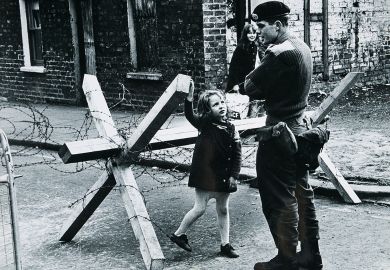The love affair between Napoleon and Persia was brief, passionate and unconsummated. Started in 1802, their courtship was conducted through spies, emissaries and ambassadors, and culminated in their fiançailles - the Treaty of Finkenstein, signed on April 1807. But the betrothed never met - Napoleon did not reach Persia. His enthusiasm cooled and, too entangled in Europe, he lost interest in the East and broke the engagement in 1809. Inevitably each side blamed the other for the fiasco. Not the least virtue of this enthralling book by Iradj Amini is the light it sheds on the misunderstandings and contretemps that beset the relationship, while giving fate its due role in the inexorable denouement.
The episode did not mean much to Napoleon - it was a passade as the French describe a very brief affair - and today the Finkenstein Treaty is largely remembered in France through Francois Mulard's famous painting (now at Versailles Museum), which illustrates the cover of this book, Napoleon receiving the Persian Ambassador . Napoleon in simple military clothes, striking his favourite pose, his right hand on his chest inside his waistcoat, is standing at the threshold of the reception room, while the Persian envoy, exotically attired in sumptuous robes and an elaborate turban, approaches him, bowing. Although they are only a few feet apart, a divide of centuries separates the two central figures, symbolised by the door between the rooms, the line of the threshold and the contrasting colour schemes.
Would Napoleon, crushed by the disastrous battle of Eylau and in the middle of his Russian campaign, take the extra step to reach the Persian and shake his hands, thereby changing the course of history?
To Persia the relationship meant a great deal. It ushered in the "Great Game" - the intense rivalry between the colonial European powers for supremacy in the Middle East and beyond. Their ultimate goal was India and its infinite riches, the jewel every crown wished to be adorned with. After 1815 and the fall of Napoleon, only two players remained in the field, Russia and Great Britain, the latter eventually emerging as the victor. But at the time of our story Persia is surrounded by rapacious predators - apart from the Europeans, the Ottoman Empire was still a force to fear.
Russia under Catherine the Great had already grabbed Georgia. Later, in a series of wars she would appropriate the whole of the Caucasus, now the Central Asian republics of Khazakhstan, Tajikistan, Armenia etc - reducing Persia to its present size. Only Afghanistan barred her way to India, and Persia, the route to the warm waters of the Persian Gulf and the Levant, both of which she meant to bully into submission.
Meanwhile, Napoleon, modelling himself on Alexander the Great, began his conquest of the East with Egypt, planning to continue towards Persia, "crossing the Indus river where Alexander had crossed it", and finally to "advance towards the British possessions" - India. "It is in India that we must attack English power," he told Talleyrand.
In Persia, the Qajar king, Fath Ali Shah, was desperate for allies against the Russians to regain Georgia. His first choice was Britain, but being at the time in cahoots with the Russians against Napoleon, the British declined to help. It was only when Napoleon entered the scene and threatened India that they panicked and sent a representative, John (later Sir John) Malcomb of the East India Company, to the Persian court with magnificent gifts. There followed several years of espionage, intrigues, pledges and betrayals, during which the Persian shah and his viziers, like guinea-pigs surrounded by huge boa constrictors, turned round in circles, desperately looking for an escape.
Amini tells the story with verve and humour, blending scholarship with skilful story-telling. At times his book reads like a picaresque novel worthy of Alexandre Dumas père . Not the least difficulty of relations between countries in those pre-technological days was communication: it took months before an envoy from France or Britain reached Asia, by which time the map of Europe had changed, battles were fought and new alliances formed. Innumerable hazards threatened the travellers on the way. At one point, Napoleon's emissary was caught by a bandit governor of a province in Turkey and incarcerated in a deep well for eight months, before being discovered by chance and ransomed.
Napoleon and Persia is enlightening in its analyses of the major players and dispels many received ideas about them. For example, Fath Ali Shah was not just a pleasure-loving king with a huge beard and a vast harem, but a shrewd ruler who tried his best to preserve his country's integrity against tremendous foes, by playing them against each other, and to some extent succeeded: Persia never became a colony. The same goes for his Vizier, Mirza Shafi, usually portrayed as corrupt and ineffectual.
The book is full of charming historical vignettes: the French General Gardane, sent by Napoleon to Persia, drilling the 19-year-old crown prince Abbas Mirza, Commander-in-Chief of the Persian Army, and being drilled by him. "Persian soldiers are brave and proud, but rebellious and utterly undisciplined," was the general's verdict after inspecting the prince's troops. But he found the Crown Prince himself intelligent, courteous, charming and willing to learn.
The British lavished money and presents on Persian courtiers, governors, officials of all kinds, buying their allegiance against the French. Yet Fath Ali Shah remained faithful to Napoleon until the end, despite the rigidity and arrogance of his ambassador General Gardane, and wrote him affectionate letters. (By the way, Napoleon's famous "The English are a nation of shopkeepers" originates in a letter to Fath Ali Shah: "You will mistrust the advice of a merchant nation, which in India trades with the life and the crowns of sovereigns. ")
Years later in exile at Saint Helena, Napoleon, looking at the map of Persia, remarked ruefully: "What an excellent fulcrum for my lever, whether I wished to harass Russia or out-flank India. I started relations with this country, and I hoped to cultivate them to the point of intimacy, as well as with Turkey. It was to be believed that these animals sufficiently knew their own interests for that; but I lost both of them at the crucial moment; the gold of the English was more powerful than my schemes!"
The affair between Napoleon and Persia was one of those rendezvous manqués with which history is paved.Pascal said that if Cleopatra's nose had been shorter, the course of history would have been different. We simply say "If only...", and sigh. This remarkable book, admirably translated by A. Azodi from the original French and beautifully illustrated with interesting pictures, entertains while giving much food for thought.
Shusha Guppy is London editor, Paris Review .
Napoleon and Persia: Franco-Persian Relations under the First Empire
Author - Iradj Amini
ISBN - 0 7007 1168 6
Publisher - Curzon
Price - £35.00
Pages - 228
Register to continue
Why register?
- Registration is free and only takes a moment
- Once registered, you can read 3 articles a month
- Sign up for our newsletter
Subscribe
Or subscribe for unlimited access to:
- Unlimited access to news, views, insights & reviews
- Digital editions
- Digital access to THE’s university and college rankings analysis
Already registered or a current subscriber? Login



